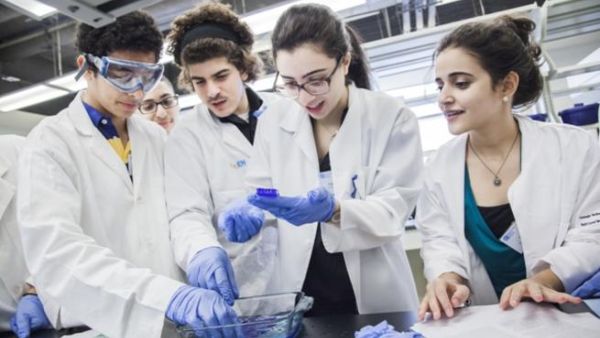Carnegie Mellon Qatar program gets high school students excited about biology

Students got a taste of a crime scene investigation during an interactive outreach program as part of Carnegie Mellon Qatar’s biological sciences and computational biology programs.
The Biotechnology Explorer Program engages secondary school students through hands-on laboratory experiences while teaching them the science behind the techniques they learn.
During last year’s program, Carnegie Mellon taught students about their immune system and simulated a disease outbreak among the participants. Students had to determine if they were affected, combining their data back to pinpoint the source of the infection.
This year, when students entered the classroom, they saw a "crime scene,” complete with an outline of the victim’s body on the floor.
From there, the students became forensic experts, collecting DNA samples from both the crime scene and the five suspects. They then broke the DNA into specific fragments using restriction enzymes and used a technique called DNA gel electrophoresis to determine the size of their fragments.
After staining their gels to see the DNA and taking a picture of their gels, they were able to compare the pattern of DNA fragments from the crime scene to see if it matched any of the suspects. A match would indicate they had found the murderer.
Over the past two weeks Carnegie Mellon hosted 60 students from 14 schools across Qatar.
"One of my primary goals with this program is to get high school students in this region excited about biology. This activity gets them interested in the problem they are trying to solve, and they forgot that they are learning a lot,” said Kenneth Hovis, assistant teaching professor of biology at Carnegie Mellon University in Qatar.
“My second goal is to help teach and prepare students to be successful as they enter the university setting to study sciences. The techniques they learn during the course of this program are basic techniques they will use in nearly any biology or pre-med program they might enter,” he added.
Israa Al-kamali of the International School of Choueifat was eager to participate, “I'm applying to Carnegie Mellon for their biological sciences major. I love biology. This program attracted my interest. I wanted to get experience in dealing with situations close to reality and to be able to know how to use different tools in the lab.”
Last year, Carnegie Mellon University in Qatar launched two undergraduate degree programs in biological sciences and computational biology. The biological sciences program is a collaborative effort with Weill Cornell Medical College in Qatar, with students receiving their degrees from Carnegie Mellon. Learn more about Carnegie Mellon Qatar’s undergraduate programs at www.qatar.cmu.edu/admission.
Background Information
Carnegie Mellon University Qatar
For more than a century, Carnegie Mellon University has challenged the curious and passionate to imagine and deliver work that matters. A private, top-ranked and global university, Carnegie Mellon sets its own course with programs that inspire creativity and collaboration.
In 2004, Carnegie Mellon and Qatar Foundation began a partnership to deliver select programs that will contribute to the long-term development of Qatar. Today, Carnegie Mellon Qatar offers undergraduate programs in biological sciences, business administration, computational biology, computer science, and information systems. Nearly 400 students from 38 countries call Carnegie Mellon Qatar home.






